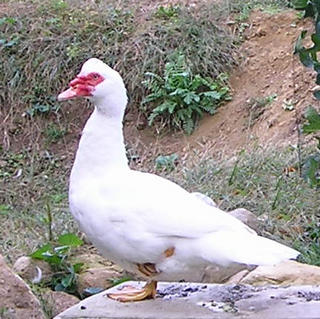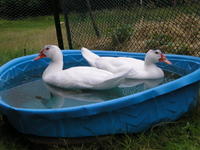I've been awake since about three this morning, my brain in high gear for some reason.
One of the mental trains I've been riding is about saving seeds. The winter and spring crops and early flowers are bolting — going to seed. Odd that we use this phrase in a rather pejorative way with ourselves. Going to seed in the natural world is actually a time of fabulous abundance and promise. Because we at Bluestone Farm are committed to preserving as much of Earth's wisdom as possible, we have instituted a seed-saving program.
Each plant has some ingenious strategy for propagating itself. One of my favorites is the columbine. Not only is it beautiful (and the state flower of Colorado, my home sweet home), but its seeding design makes gathering a breeze. As with many flowers, the base of the flower becomes the seed "womb". The base of a columbine looks like a cup formed of tightly rolled petals. As the seed matures, the petals unfurl to form a pretty little open cup.
The cup remains upright on the stalk, so it takes a passing animal or a heavy bee or dragonfly to tip the cup and drop the seeds to the ground. For human gathering, this design allows me to simply tip the cup over my own little gatherinng bowl and out come the seeds.
Each flower has about six petals to a cup, and each petal holds about seven to ten seeds. Let's see ... that would be somewhere between forty and sixty seeds per flower, right? Our columbines have somewhere in the neighborhood of thirty flowers going to seed on each plant at the moment, which means the columbine plant knows it will take
1200 to 1800 seeds to insure that at least one new plant will make it to adulthood, flowers and seeds, next year. Whoa, is that abundance or what?
Or take the broccoli raab plant. When it bolts it looks like an entirely different plant. Gone are the tasty green leaves and little yellow flowers. When this plant goes into seed production it transforms into stalks with long slender seed pods growing on a short stem along the main stalks. Brocoli raab pods hold about ten small seeds each, and to get them you have to wait until the plant — stalk, stems and pods — are thoroughly brown and dry. Then comes the fun.
The stalks must be carefully cut, since their pods are designed to burst open at the slightest jarring. What with deer, turkey, coyote, raccoon, voles, wood rats, swooping owls and God knows who else playing near the plants, this design strategy is a great one. Makes human gathering more of a challenge, though.
Carefully, carefully select the driest stalks and place them gently in a roomy container. Carry this gingerly back to the harvesting table. Now at this point my own harvesting strategy differs from Sr. Heléna Marie's. She goes with the oldfashioned way: hop into the roomy container and stomp on those pods until all the seed has fallen out. Then toss the pods and stems carefully back and forth between your hands to free any lingering seeds; throw the chaff into a bag for future mulching duty and admire the seeds left at the bottom of the roomy pot.
Now I prefer a more refined approach. I carefully use my hands to squeeze the pods (OK, it's more like crushing them) open over a collander in a bowl. Then I use a classic threshing move (like TV chefs do with food cooking in a frying pan) to remove the seeds from the chaff. If I'm really being anal-retentive, I then use a fine strainer to remove dirt from the seeds. A perfectly ridiculous process, since the seeds will be going into the dirt again next year anyway, but I think it
looks better. I'm all about appearances.
Back to the number-crunching: ten seeds per pod, an average of twenty pods per stalk, and maybe twenty-five stalks per plant ... um, that's ...
5,000 seeds. No wonder I'm making so many seed packets for broccoli raab.
Earth wisdom says if a few seeds are good, a zillion must be better. It's a great survival strategy. Even humans are given to amazing abundance when it comes to reproduction: millions of sperm are produced every minute in males and a few thousand eggs form in each female fetus before birth. Given the odds against eggs and seeds surviving the perilous reproduction process, abundance is a very good thing.
Lots and lots of potential babies mean that the whole system can sustain itself. A few aren't high quality, some never get to the right conditions, many are consumed to provide energy for other species, lots of them root and grow, but never make it to adulthood ... we are flooded by the message of abundance, and yet we humans seem to hang onto a scarcity context for ourselves.
Pretty hard to live in this abundant Universe while holding on to the belief that there's not enough — of anything.
 I just went down to get an early morning cup of coffee, and this was the view that greeted me from the kitchen window. No matter what kind of rotten, sad, grumpy or grinchy side of the bed I might wake up on, the God of wonder can yank me to the other side in a heartbeat.
I just went down to get an early morning cup of coffee, and this was the view that greeted me from the kitchen window. No matter what kind of rotten, sad, grumpy or grinchy side of the bed I might wake up on, the God of wonder can yank me to the other side in a heartbeat.

















